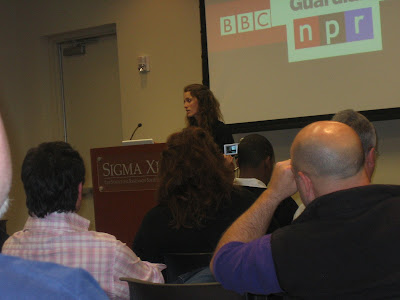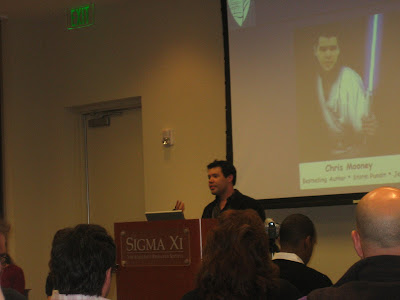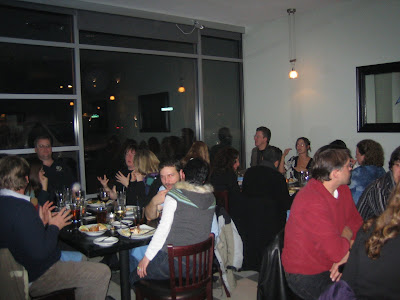Welcome to the latest installment in my occasional series of interviews with people in the scitech world. This time around the subject is Christopher Leonard, Associate Publisher of PhysMath Central. While I've never met Chris in person, we first became acqainted in the online world when he was doing his Computing Chris blog while at Elsevier, a lively and insightful view into the world of publishing and computer science. His new position at PhysMath Central seemed like a good opportunity to elicit some of those same lively and insightful peeks into the world of open access publishing. Thanks to Chris for his thoughtful responses. Enjoy!
Q0. Hi Chris, tell us a little about yourself and how you ended up as Associate Publisher of PhysMath Central?
It is a strangely circular story. I'm a scientist with an undergraduate degree in colour Chemistry from the University of Leeds. I wanted to do something a bit different to 'plain' chemistry and this was ideal for me. Upon completion of that I did a PhD in photo- and thermo-sensitive coatings, for which I was mainly based in Oxford at the commercial R&D centre of my sponsor. Nearly 7 years of lab work had convinced me that my future lied outside of the lab, but I was still interested in what was happening in research -- which was when I heard of new company starting up which sounded perfect to me.
It was 1997 and the new company was called ChemWeb.com, which was an online community for research chemists and offered a great number of innovative services - such as access to online journals, job listings, free online conferences with simultaneous video, audio and chat, its own webzine, The Alchemist, and even its own preprint server for chemists. Now, more than 10 years later with RSS, blogs, and social networking, much of this sounds mundane, but at the time it was definitely cutting edge stuff.
As part of the Current Science Group, we were based in the (externally) beautiful offices of Middlesex House on Cleveland Street in London. I was there for 2 years until ownership changed and ChemWeb.com and its sister company BioMedNet were sold to Elsevier. Now I had the opportunity to work in the Elsevier headquarters in Amsterdam and jumped at the chance! Initially I was Publishing Technology Manager - maximizing the opportunities of the web and the content of Elsevier journals to create new products, but after a few years I decided I needed to experience life at the coal-face, as it were, in 'real' publishing.
As a publisher in Elsevier I certainly got a feel of the issues facing researchers and librarians very quickly. I was in charge of various portfolios of journals in mathematics, physics and computer science and all of these disciplines had the same concerns - namely the prices of subscription journals, 'big deal' packages for online access and the questioning of the value-add by the publisher -- this by people fully au fait with TeX and the issue of hosting articles for retrieval in a large database.
It didn't take me long to see that Open Access was the future. I was aware that the biosciences were well served by PLoS and BioMed Central, but there were few options for chemists, physicists, computer scientists etc, to get research published in peer-reviewed, open access journals. Then I heard that BioMed Central were looking to expand into exactly these areas. My former colleague at ChemWeb, Bryan Vickery, explained what they wanted to do with PhysMath Central and I was sold. So here I am, back in Middlesex House again, sat next to Bryan again!
Q1. Please tell us a little about PhysMath Central and how it works? What is your vision of a sustainable publishing business model, if I may use that term.
PhysMath Central is based on the same model as BioMed Central - namely that the costs of publishing are covered before publication. This way we can make the article available, permanently, for free. The articles are published under a Creative Commons license, which allows anyone to sue the article freely, so long as the original authors, citation details and publisher are identified. This means that an individual could, in theory, have a copy of all articles published by BMC or PMC, in full, on his hard disk, or even website. It also opens up a host of possibilities with data mining since all our articles are available in full text as XML/MathML.
We also make sure all of our articles are deposited and permanently archived in a number of national archives. For PhysMath Central, this includes arXiv.org, whom we work closely with (indeed authors can submit to us using just their arXiv IDs).
These 3 elements are what I call the ABC's of true open access publishing: Access (immediate and free), Back-ups (permanently archived by third parties) and Creative Commons (copyright model).
As to what makes a sustainable model, that answer will vary slightly from discipline to discipline. BioMed Central are just about to break even after 7 years of publishing with a model which combines institutional prepay subscriptions, payment from author research grants, sponsorship from funding bodies, and many other smaller sources. We also offer waivers automatically to all authors from countries with low-income economies (as defined by the World Bank).
In addition, in physics we are witnessing the birth of an exciting project called SCOAP3, which intends to centralize library budgets in high-energy physics to pay for open access to every paper in this field.
In other areas, research grants are typically either non-existent or very small. Here it is unreasonable to assume a grant-paying model will work, and as such we will investigate other options for covering open access charges. A central fund for an institute, or a whole field (as with SCOAP3), or even sponsorship would be a more likely way to achieve sustainable open access for these disciplines.
Open access publishing doesn't cost more than traditional publishing (indeed, it is much less), but we need to be able to redirect the available resources to make sure that money spent today is freeing research to the whole world - rather than it funding barriers to its access.
Q2. How's the new PhysMath Central blog going? What do you think the importance of blogging is for a publisher?
The PhysMath blog is something I was very keen on starting when I started here. It is a way to keep people informed, a little more informally, about what is happening with various projects behind the sciences, and also allows me to chip in with my 2 cents on major topics in physics or open access in general. As a new publisher with no published articles until around a year after we started the company, it was essential that people could see we were busy behind the scenes and getting things ready for launch with mock-ups, editorial appointments and various other mini-projects.
For a more established publisher, I still think blogs are an invaluable 'other' way of keeping in touch with your readers/authors/librarians etc. I'm well aware that only a small fraction of the online public regularly read blogs though, and so we also spend a lot of time with traditional outreach methods such as advertising, conferences, email promotions etc.
Q3. And by the way, I sorely miss your old Computing Chris blog...Any chance of reviving something along those lines?
I started that blog whilst at Elsevier after having being inspired by Robert Scoble, then of Microsoft. He wrote an entertaining, authoritative and personalized view of things happening behind the scenes at Microsoft and had transformed the company's image amongst developers. It had a history of monopolistic bullying, but Scoble had made it appear marginally but noticeably less evil to the outside world. I thought, if it can do that for Microsoft -- what can it do for Elsevier? We could do with a humanizing face to our authors and readers, so I started the blog off. It became quite popular in a very short time frame, but I had a feeling that others in the company didn't appreciate this direct line with the outside world, and indeed when I left it was closed down.
The style of writing was very conversational, and subject matter sometimes completely unrelated. I haven't adopted that style fully with the new blog as it feels wrong to have a publisher blog, closely related to and accessible from the site, report on what I had for lunch or a funny sign I saw on holiday. However, that may change. I am currently spending most of my time on getting new journals up and running and reporting on that rather than being entertaining. Besides, with a young baby at home, my extra-curricular activities would quickly become boring to readers not interested in diapers or wine!
Q4. You have user comments on papers -- any other web 2.0 functionality coming in the future?
I am hesitant to push all things web 2.0 as it seems that uptake from authors is inversely proportional to how difficult something is to set-up. Commenting on a paper is a relatively simple way to get a 2-way conversation going on the site, which could have scientific merit and is reasonably well-used. We have also recently implemented the facility to save an article to the social bookmarking site of your choice, including Facebook, where we are also examining what we can do with Groups.
We are experimenting more with the concept of a journal than with the bells and whistles around it. For instance we have recently launched BMC Research Notes, which aims to provide a home for short publications, case series, incremental updates to previous work, results of individual experiments and similar material that currently lack a suitable outlet. The intention is to reduce the loss suffered by the research community when such results remain unpublished. We also have the Journal of Medical Case Reports, which publishes open access case reports across all medical disciplines, which will be aggregated into an online, fully searchable database, creating a valuable resource for clinicians and researchers.
Q5. First it was BioMed Central, then Chemistry and PhysMath Central, what's next? Is computer science going to be included in PhysMath Central? It seems that the engineering disciplines are particularly poorly served by Open Access.
We certainly plan to launch our first computer science journals in 2008, so yes, computer science journals will be included in PhysMath Central, but given the name of that platform, it may make sense to have a dedicated computer science platform instead. Expect to hear some news on this before the summer.
You are right in saying that Engineering is not well served by Open Access - although Hindawi have some titles in this area. However once central funds for open access are in place, you will see an expansion of journals in all areas, including engineering and the humanities.
Q6. What do you see as the future of scientific publishing? Will we even be able to recognize something called a journal (or even a journal article) in 5 or 10 years?
Personally, I think at some point in the future, journals will cease to exist as we know them, but will still exist as a 'brand'. The holy grail for scientific publishing, at least as far as users are concerned, would be an open access database containing all scientific articles ever published (including grey literature and preprints), all cross-linked and cross-referenced. All the usual metadata would be interoperable, searching would cover everything, raw data would be just a click away. However, in order to sort the wheat from the chaff, peer-reviewed articles would be identified as being peer-reviewed. Which editorial board approved the peer-review for a certain article would also be shown. This means that a journal 'brand' could live on as the editorial board reviewing and approving certain articles in the database.
Technically, I think we could do this now. Whether the political and economic conditions for it to happen within 10 years will occur, I doubt. But it will happen eventually.
It is tempting to think of journal articles evolving over time too, but the versioning of each new amendment or addition would need to be peer-reviewed too, to keep up editorial standards. For instance it is easy to think of a wiki-type journal where the authors (or any authorized person) can all amend the document over time. But if an original version had passed a rigourous peer review process and it had then been rewritten in part or in whole, are those amendments correct and of a standard of the original text?
I think that comments and notes on the original text, but which preserve the original text, are therefore more likely to be the future -- and indeed this is exactly what we have with PhysMath Central.
There is also the issue of how articles are authored. Authors in our field are still very wedded to the idea of authoring documents for print presentation in TeX, no doubt due to the influence of arXiv. I would hope that the benefits of online publishing become apparent to authors within the next few years. Documents which combine text with interactive formulae, video, audio, raw data sets should become the norm.
Q7. Is there an Open Access tipping point in the near future, where suddenly all sane scientists will suddenly think to themselves, "Of course! It all makes sense now! Why would I ever publish in a journal that wasn't Open Access?"
There was an excellent 'guerilla' project in some major US university libraries recently where students placed stickers on journals informing the reader of the price of a subscription to that journal. When you're suddenly confronted with the fact that your Nuclear Physics A subscription costs the library $25000, that's a shock the system.
I think every researcher who has ever published has tried to access an article from a subscription journal and been thwarted at some point. That is annoying for them, but for people in developing countries, it is an everyday occurrence seriously hampering the rate of development of research.
I think the big tipping point, however, may be a financial one. As library budgets plateau or decrease, the 'big deal' packages simply become unaffordable. Having access to 1000s of journals switched off overnight may jolt people into realizing that open access isn't an option anymore, it's the only way which makes sense.
Q8. Who do you see as your main competition? Or is it even meaningful to talk about competition for an OA publisher?
I don't spend a lot of time thinking about 'the competition'. In one sense we are in competition with commercial publishers, but since we offer very different services, maybe not really. We are more obviously in competition with other OA publishers, but there are still a lot of articles published in the world and only a small, though increasing, proportion are published in open access journals. Until everyone is publishing in OA journals as a matter of course, we are all happily coexisting for now!
Q9. How about the recent push back from some of the commercial publishers, like the all the fuss about the PRISM Coalition?
I view a lot of this 'push back' with nagging sense of unease and disappointment. Of course directors of multi-million pound companies are going to defend their positions, but to do so with a disinformation campaign with the aim of spreading Fear Uncertainty and Doubt, leaves a sour taste in one's mouth. I think the number of publishers who have publicly dissociated themselves from PRISM is a sign that they seriously misjudged the mood of most of their members -- and the majority of scientists, if number of blog postings is anything to go by.
Thankfully with people like Peter Suber on our side, the open access movement is always ready to strike back with some facts. As each day passes it seems to me that open access for all areas of research is inevitable and unstoppable. My favourite quote on open access actually predates the movement and is from Albert Einstein: "The free, unhampered exchange of ideas and scientific conclusions is necessary for the sound development of science, as it is in all spheres of cultural life". Open access publishing is huge step forward to make this happen sooner, rather than later.




























